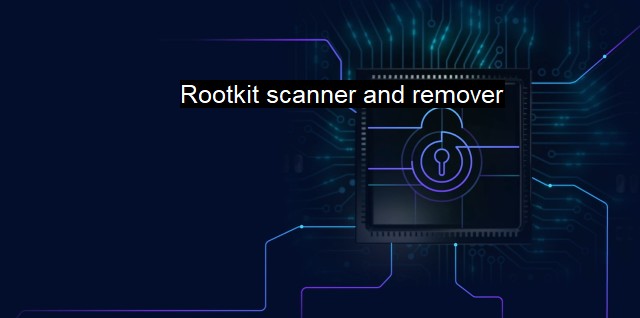What is Rootkit scanner and remover?
The Danger of Rootkits: How Malware Hides in Your System and What You Can Do About It
A Rootkit scanner and remover is a highly useful tool to safeguard a system's security from potential threats. The world of cybersecurity considers rootkits to be one of the most ominous forms of malware as they operate in secrecy, using stealth techniques to hide from both the user and antivirus programs, embedding themselves within a system's software, operating system, or firmware and exerting control over these platforms.Rootkits earned their name from the administrative rights- 'root access’ that they adopt once they invade a system. Today, cyber-attacks have grown sophisticated, with hackers deploying hidden object type Rootkits, which are not rooted but employ rootkit techniques. They often steer clear of default antivirus software, which normally works on signatures or behavioral aspects of files. Due to their sneaky and discreet nature, basic antivirus software finds it challenging to detect and remove rootkits, making specialized rootkit scanner and remover tools a necessity.
A rootkit scanner's key function is to scrutinize a system for any indication of rootkit infection. These could include a suddenly sluggish system, abnormalities in hardware behavior, unexpected decrease in storage capacity, or repeated hacking attempts. Since rootkits themselves are nearly invisible to simple antivirus and antimalware software, rootkit scanners are designed to dig deeper. They work by scanning the computer’s bootstrap sector since rootkits often infect this area upon entering your system, digit by digit searches of file signatures, examining raw data on the hard drive, or employing AI-assisted methods to examine inconsistencies in system files.
Once a rootkit infection is detected, the rootkit scanner performs digital “surgery,” often called 'remediation', utilizing its remover functionality. Different rootkit removers may operate differently. While some incorporate a recovery method that restores system files by using a clean version, others might completely erase the tainted files and overwrite them with healthy ones. A software like Microsoft’s MRT (Malicious Software Removal Tool) restores a system’s integrity by isolating infected system files and eliminating them via countermeasures, thereby preventing any rootkit replications.
Most renown security software companies supply rootkit scanners and remover programming in their premium versions, as the technology needed for this level of filtration is complex, especially since every rootkit removal alters the core system. Though a specialty tool on its own, common forms include standalone rootkit scanners/removers, antivirus protection packages with integrated rootkit scanning or internet security suites with full-circle protection.
Investing in a top-tier rootkit scanner and remover can be a prudent business move that can potentially avert a cyber catastrophe. Within the cybersecurity circles, it is widely upheld that averting a cyber-attack is far more cost-effective compared to counteracting one. Besides the quantifiable monetary damages, cyber threats elicit a range of scrimmage such as data breach, downtime, reputation damage, and loss of customers' trust.
Importantly, it is critical to appreciate that malware scanners and removers work best in a broader security approach that encompasses firewalls, internet security suites, password managers, and encryption. Hackers frequently adjust strategies; they now adopt no-touch attacks that involve super-covert weaponries like file-less malware and PowerShell attacks.
The advent and technological improvements of rootkit scanners and removers signal progress in combating one of the most innovative threats to cybersecurity. While it is no panacea in the ever-evolving landscape of cyber threats, a rootkit scanner and remover is a potent ally in securing your online world, complemented with a comprehensive patch of security best practices and vigilant digital behavior.

Rootkit scanner and remover FAQs
What is a rootkit scanner and remover?
A rootkit scanner and remover is a tool designed to detect and remove rootkit malware from a computer system. Rootkits are malicious software programs that hackers use to gain unauthorized access to a computer system without being detected. A rootkit scanner and remover can help protect against these types of cyberattacks by scanning the system for any signs of rootkit activity and removing any identified threats.Why do I need a rootkit scanner and remover?
You need a rootkit scanner and remover to protect your computer system against cyberattacks. Rootkits are often used by hackers to gain unauthorized access to a system, steal sensitive data, or perpetrate other malicious activities. Without a rootkit scanner and remover, you may not even be aware that your system has been compromised, and the rootkit may be able to operate undetected for extended periods of time.How does a rootkit scanner and remover work?
Rootkit scanners and removers work by scanning the computer system for any signs of rootkit activity. This involves looking for any hidden files, processes, or registry keys that may be associated with rootkit malware. Once the scanner identifies any potential threats, the remover tool removes them from the system, thus eliminating the rootkit and its associated activity.Are all rootkit scanner and remover tools the same?
No, not all rootkit scanner and remover tools are the same. Different tools may have varying levels of effectiveness and may use different techniques to detect and remove rootkit malware. It's important to choose a reputable and well-reviewed tool that is regularly updated to ensure the best possible protection against rootkit threats.| | A | | | B | | | C | | | D | | | E | | | F | | | G | | | H | | | I | | | J | | | K | | | L | | | M | |
| | N | | | O | | | P | | | Q | | | R | | | S | | | T | | | U | | | V | | | W | | | X | | | Y | | | Z | |
| | 1 | | | 2 | | | 3 | | | 4 | | | 7 | | | 8 | | |||||||